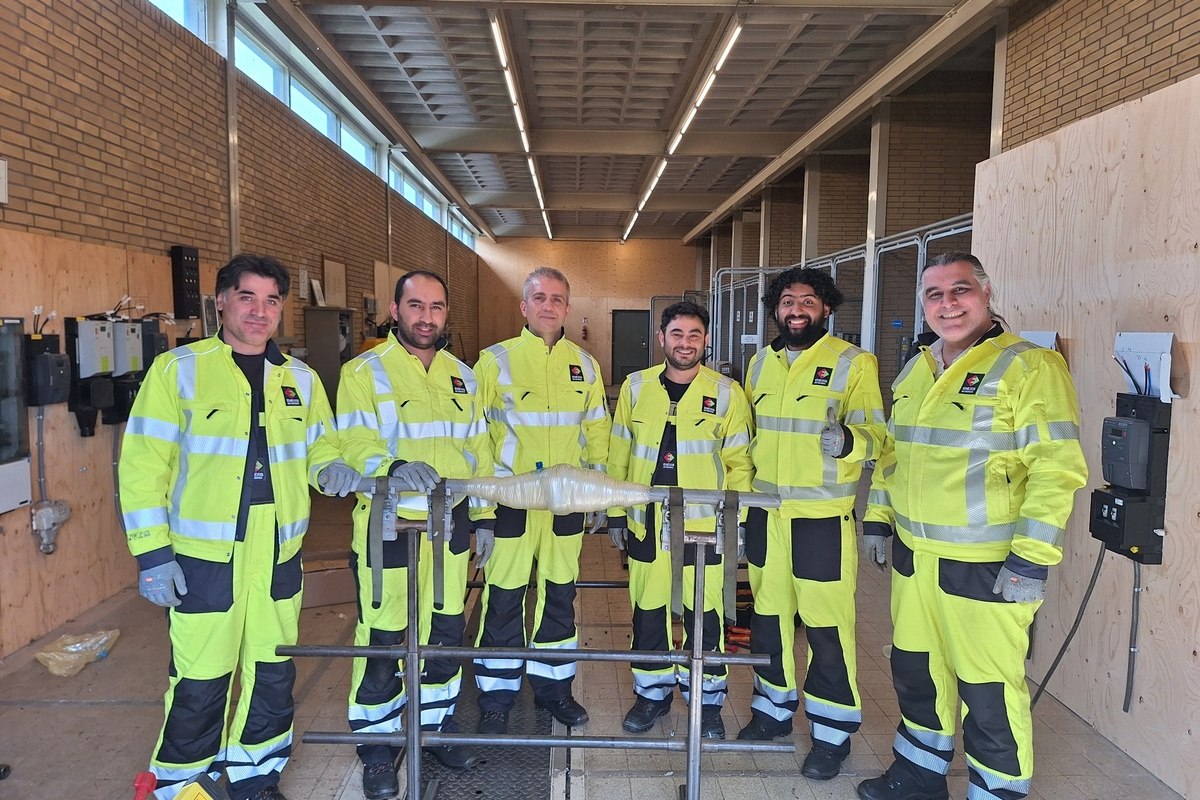Energy transition requires skilled workers
12 may 2025
‘I dare to talk more and give real answers’
How Enexis trains status holders to become electricians with the help of Dutch language training
By Joris van Dierendonck
Energy transition requires skilled workers, a lot of skilled workers. But where do you find them in a tight labour market full of competition for technical staff? At Enexis, they recruit not only people with exactly the right qualifications, but also status holders who are driven to build a new life in the Netherlands. In a bridging programme, they are prepared for a career as an electrician. Language training from STE Languages plays an important role in this.
“It started five years ago with an idea from Younes Biyadat, one of our managers”, says Kim Neervens, Project Leader at Enexis. “Inspired by his parents who came to the Netherlands as migrant workers in the 1970s, Younes knew that there was a lot of potential among people who wanted to work here but still had to find their place.” Enexis saw the potential and decided to organize an internal training programme for this. “We have opened the doors to motivated status holders who want to work with us”, says Kim. “You don’t need an electrical engineering background, an affinity with technology is enough. Participants come from all corners of society: from maths teachers to lawyers or police officers.”
Safety starts with language
Enexis has an internal vocational school. There, participants are trained to become electricians, among other things. Before the status holders start this vocational training, they first follow a four-month bridging programme. This programme is intended to help participants find their place within the company. A central part of this is language training. Kim: “Speaking the language is extremely important. If you work with electricity, you must know what you are doing and understand your colleagues well. Mistakes due to miscommunication can have major consequences. That is why language is more than a tool at Enexis. Because safety is Enexis' number one priority. We work safely or we don't work at all.”
Annemarie van Balen, one of the language trainers, agrees: “Participants usually already speak some Dutch, but that is not enough for the work they are going to do. They often speak easily, but do not finish their sentences, use English or reverse the word order. We help them to communicate clearly and correctly, so that they can work safely and independently.”
Learning in practice
For sixteen weeks, the participants receive language training in-house at Enexis. It is an intensive and practice-based programme. They practice customer conversations, become familiar with jargon, write reports, do role-playing and work on speaking assignments. Step by step, they improve their pronunciation, writing skills and vocabulary. Everything is focused on applying language in the context of work. Annemarie: “We practice with realistic situations, for example you are at a customer and have to explain something. How do you do that? You call a colleague about a malfunction, what do you say then?”
Cultural aspects are also part of the programme. Participants learn to deal with Dutch work culture: what is expected of them and when, what do you do if you are late, and how do you address someone? During excursions, such as to the Philips Museum, they also get to know the City of Eindhoven.
Confidence grows with language
For participants, language training is much more than a lesson programme. It has a significant effect at work and beyond. “When I used to be asked a question, I usually just said ‘yes’. Now I make sentences and really answer”, says one of them. “I dare to talk more, also at home with my children, with the neighbours. I wouldn’t have done that a year ago.”
Language and self-confidence are inextricably linked. If you have the words, you dare to give your opinion or ask a question. “To speak a language, you need self-confidence. I get that here. From the teachers, from the group and from my colleagues.” That confidence grows in small steps: during speaking assignments, when practicing customer conversations or just during the lunch break. “We have been given a huge opportunity to improve our language skills. Now we sit in the canteen and colleagues talk to us. That really helps. That’s how you learn.”
Yet it’s not easy. It takes courage to speak, to make mistakes, and patience to practice again and again. What doesn’t help is when the environment switches to English too quickly. “Dutch people often want to speak English right away. But just speak Dutch with us! That’s the only way we can really learn.” Ultimately, it’s about belonging. Understanding what is being said in a meeting. Daring to say something when you disagree with something. Being able to be yourself in another language. Or as they say themselves: “If you don’t have contact with others, a language will never become second nature. But when people talk to you, you learn. Then you feel: I belong.”
Moving forward together
After language training, the participants start a two-year vocational course to become electricians. There is also guidance in the form of practical coaches. In addition, each participant is assigned a ‘buddy’. ‘A buddy can help them with questions in the workplace, and also with practical matters in everyday life,’ says Kim. ‘I know buddies who even go with them to the doctor or take someone to dance lessons. Of course, that is not necessary, but it happens spontaneously. That is, of course, wonderful.'
Ambassadors
Several participants from the first group have moved on to positions as facilitators or engineers at Enexis. “Our participants are our best ambassadors”, says Kim. “They help each other, but also us. They show that this works. We have very good colleagues, and we don’t even have to recruit anymore. If we announce that we are starting this programme again, the available places will be filled quickly.”


